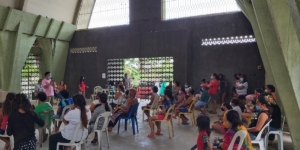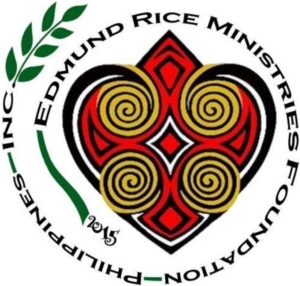Compassionate Education
ERMFPI is committed to the principle that learning should not be confined within the four walls of a classroom. The Blessed Edmund Rice story is all about care and compassion for children. It has been greatly moved by the profound realization that those organizations that live from and by this story has their moral obligation not to ignore the plights of children in our world. ERMFPI seeks to work with children, their families and communities so that all children in all its adopted communities are able to participate in meaningful program and projects that will have a lasting impact on their lives in the future.
The Compassionate Education program aims to create a need-based learning space and educational support where participants are capacitated and encouraged to take positive actions towards their future. This is in response to the recent World Bank’s report that 9 out of 10 children in the Philippines at late primary age are not proficient in reading. Such a decline was exacerbated by more than two years of remote learning due to the Covid-19 pandemic. On top of this worsening situation, children are constantly facing risks of dropping out of school due to poverty. It is seen as the primary culprit among ERFPI’s adopted communities. Majority of the adult community members have only reached the primary level of education thus creating a vicious cycle of deprivation- economic, educational, cultural and social disadvantage, that when left unaddressed will be handed down to their children’s generation.
Health and Nutrition
Although there is quite a handful of Health and Nutrition programs being implemented by Government and Non-governmental Organizations, the Philippines continues to grapple on the issues of malnutrition specially among children. Contextually, there is not much of a difference with ERMFPI’s partner communities. As with other ERMFPI’s programs, health problems are commonly associated with economic concerns and has been part of a complex web of a mirage of consequences. Among other things, poverty is seen as both a cause and consequence of disability. Disability perpetuates poor economic conditions as it may result to discrimination when applying for a job or an eventual job loss and significant additional expenses for maintenance. Being at the margins could also result to disability because of poor nutrition and inaccessibility of quality health care services. Sources of clean and safe drinking water is also a major concern among ERMFPI’s partner communities and unhygienic practices are very much evident. In the Sama-badjao community (Dolho, Bato Leyte), there was only one source of water in the area before ERMFPI came into their community. An elongated tube that is protruding from the ground which will be flooded by sea water during high tide. In Brgy. Carreta and Tinago, Cebu City, drinking from the tap water will almost certainly result to stomach problems and as a result it became an additional expense to the residents as they have to outsource their drinking water outside of their community and buy them gallons.
The Health and Nutrition program aims to implement a sustained community education on health, food and nutrition to increase community members’ awareness on health promotion, nutrition, illness prevention and disability rehabilitation. Through the FAITH (Food Always in The Home) program component, it was also designed to promote sustainable gardening in order to ensure sufficient supply of healthy and nutritious means of sustenance. All projects under this program are to be developed in targeting the three (3) key priority areas: a.) Improved Health and nutritional status of children b.) Communities have access to primary health care and rehabilitation through networks and partnerships c.) Communities have improved health status through producing nutritious and safe food at home.
Eco-enterprise Development
The program aim is two pronged: to provide a sustainable income to poor communities and at the same time encourage good practices through upcycling trash to various products. Recognizing that the cry of the earth is not a separate issue to the cry of the poor, ERFMPI takes on the Asset Based Community Development (ABCD) approach in consciously enhancing the existing skills of the locals and turning household waste into precious raw materials that will develop into a collective Eco-friendly enterprise. Tapping design, branding and marketing experts, the Eco-enterprise Development program addresses both concerns of livelihood and waste management.
Incentives are also being provided to encourage positive response and active participation among community members wherein a holistic approach in capacity building on environmental conservation awareness, skills training, financial literacy and values formation are integrated into a single focused endeavor.
Critical Intervention
While disasters continually threaten all people from all walks of life, it is the people at the margins who are being disproportionately affected whenever a disaster strikes. Their struggle is evident throughout history, albeit numerous declarations, standards, policies, and guidelines set by government organizations and other humanitarian actors. In times of crisis, although it is common that affected communities receive assistance through relief operations; food and non-items being provided are generic and inconsiderate of the different needs of the people. There is a glaring need to recognize that people’s needs are not homogenous and inclusive response is crucial during emergency situations.
The Critical Intervention program aims to provide inclusive and timely support to communities in times of crisis and emergency situations. It seeks to provide quick and timely response to food and non-food item needs including psychosocial support prioritizing the vulnerable sectors such as women, children, elderly and persons with disabilities. Support interventions of the program are based on the implementation of Damage Assessments and Needs Analysis (DANA) and through gathering disaggregated data, with active participation of the community members themselves.
Social Advocacy
Grounded from the principles of social justice and human rights, ERMFPI is fervent on its belief that justice can never be attained without acknowledging that every human being has this inherent dignity which should be honoured and respected. It takes on a Rights Based Approach (RBA) to development and advocates for a society where no one is being left behind. In all its initiatives, an advocacy component is inherently integrated to expand organized efforts of partners and stakeholders, mobilizing them into action and solicit commitment from duty bearers to act on the problem at hand.
The Social Advocacy program was developed to support in assessing the needs of target groups in achieving socially accountable society and to bring people become more aware of their rights, exercise those rights and be in control in making decisions about their lives. Initiatives under this program focuses on capacitating potential leaders and volunteers that will serve as agents of change within their own community. It recognizes that it is the people themselves will ultimately solve their own problems and community development workers are merely facilitators of development.
Linkage and Network Building
Building strategic alliances among domestic and international partners and potential stakeholders is ERMFPI’s top priority as this allows access to new knowledge and complementary resources that will ultimately benefit the poor and the vulnerable. In its effort empower communities and liberate lives from the chains of inaccessibility and marginalization, ERMFPI’s mission is to engage in pro-active partnerships, stewardship and community participation in realizing human dignity and social justice.
Locally, the Cebu Centre will serve as the hub for local resource generation particularly for funding and gathering pool of expertise relevant to different initiated projects. Key components of this program is ensuring that ERMFPI’s social media accounts are regularly updated, strengthening social marketing and sustaining memberships in local special bodies, timely compliance of requirements with government agencies and local and international fund raising.
Resource Development
Primary focus of the program is to develop an effective system of acquiring, maintaining and increasing the resources and creating the conditions for its best use to ERFMFPI. It has five sub-components: a.) Financial Resources b.) Asset Management c.) Human Resource Development d.) Board and Governance e.) Systems and Procedures
Knowledge Management
Tracking the effectiveness and efficiency on everything that We do is non-negotiable. This provides assurance to local and international funders/donors that their support reaches the target beneficiaries. This program establishes an efficient and effective system in keeping and managing institutional information for sharing and tracking program and project outputs, outcomes and impact. Knowledge Management has two major objectives: a.) Increase availability of ERMFPI’s institutional information and b.) Strengthen social media presence
empowered communities, liberating lives…
Thank you for your donation











